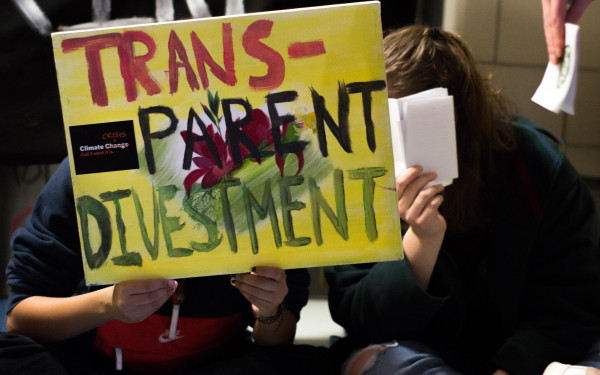The Economics of Fossil Fuel Divestment
The earth’s lifespan is thought to be as long as 4.6 billion years, while the human species’ only a few hundred thousand years.
Astrophysicist Carl Sagan famously put these numbers into perspective by organizing them into one solar year. The Big Bang kicks the year off; humanity only rears its head on New Year’s Eve.
Divestment is a movement that seeks to pressure institutions to withdraw investment from the fossil fuel sector, in order to accelerate the transition to more responsible energy systems. The Divest Movement is global, led by 350.org and enlisting the support of over 600 institutions worth $3.4 trillion and over 50,000 individual investors worth $5.2 billion.
Some high-profile names—including the Rockefeller Brothers Fund and the Norwegian Sovereign Wealth Fund—have divested from fossil fuels already. Many universities have joined the pack, with schools such as the University of Glasgow and the University of Copenhagen fully divesting. Other heavyweight schools such as Yale, Stanford and Oxford have some form of divestment underway.
Recently, the University of Ottawa nearly fully divested, but settled to “shift” fossil fuel funds. In 2014, Concordia made headlines for being the first Canadian university to create a Sustainable Investment Fund—worth $5 million—to test the waters, as it were.
Nevertheless, no Canadian university has fully divested.
From Nov. 15-17, Concordians will decide whether or not to support the divestment of Concordia’s endowment fund, which has over $10 million invested in the fossil fuel industry. This decision shouldn’t be taken lightly and has implications beyond simply supporting a brand of energy policy over another.
Thinking in Geological Time
Much of the world’s fossil fuel reserves were formed roughly 300 million years ago, when coal forests died out and formed coal deposits. These forests actually contributed to global cooling in their heyday. Industrialists started unearthing their sediments during the Industrial Revolution. Since then, fossil fuel consumption and ensuing green house gas emissions have been rising at rates unmatched by most other global trends—causing global warming.
From this perspective, modern climate change will be recorded as a mere slice of Earth’s history. Yet to humanity, the consequences aren’t minimal.
From the first one 450 million years ago to the disappearance of dinosaurs in the Cretaceous, Earth has persisted through five mass extinctions. Environmental scientists are warning that the sixth is underway.
We need to remember that history is not just a thing of the past. When we reconsider our position in the grand scheme of things, we realize we participate in its composition. We are the future’s history. Let’s act like it.
Economics and the Environment
Economics as its own discipline only emerged in the 20th century. Before that, the study of resource allocation fell under the auspices of Political Economy. In other words, the discipline is relatively young.
Likewise, many of the environmental sciences that underpin recent environmentalism gained importance in the mid-20th century. One popular example is Rachel Carson’s Silent Spring, published in 1962, which revealed the damaging effects of pesticides on ecosystems.
These developments helped us build an understanding of our place in the world, and highlight the need for renewed effort to live more harmoniously.
With this in mind, divestment is an expression of how we choose to relate to nonhuman environment. It’s easy to consign the nonhuman world to the category of simple resources for our consumption. It’s harder to find a more ethical way of relating to this environment.
Traditional economists would typically shriek reading this kind of argumentation, suggesting it fails to consider the virtues of markets and of economic rationality. To some extent that may be true, as I can’t say the doctrinal aspects of some economic theories resonate with me.
Economists neglect to study how their discipline affects our perception of the world. As Michael Sandel, professor of philosophy at Harvard, writes in What Money Can’t Buy, “when we decide that certain goods may be bought and sold, we decide, at least implicitly, that it is appropriate to treat them as commodities, as instruments of profit and use.”
Deciding that the world and everything within it can be appropriated, commodified and traded comes with consequences. It may in fact be our undoing over time.
The Promises Beyond the Question
Two kinds of promises underwrite the divestment question. First, if our economic thinking doesn’t heed the warnings of environmental scientists, this may stunt the prosperity of future generations.
Writing for the United Nations’ International Panel on Climate Change, economist Nicholas Stern cautioned that climate change poses costs in the years to come. Depending on the risks taken into account, these could range from five to 20 per cent of world production.
In the late 1990s, Robert Constanza, an ecological economist at the Australian National University, examined what is commonly termed ecosystem services—or, the natural functioning of the environment, such as providing water supply and soil. His research estimated the global value of these naturally occurring “services” at $33 trillion annually, and recently updated this number to $125 trillion.
The second promise is a hopeful one. Global employment in the clean energy sector is on a constant rise. In 2014, direct employment in the clean energy sector outnumbered that in the oil and gas sectors in Canada—even before the fossil fuel sector plunged to unusually low price levels. In the U.S., jobs in the solar sector alone outnumber those in the fossil fuel sector.
By the same token, the International Energy Agency reported that in 2015 the renewable energy sector surpassed coal in global electricity production—which made it the most important supplier worldwide. The IEA also reported that this sector is set to be the fastest growing in the years to come.
The question we now face is how to move forward. Earth’s geologic record is characterized by mass extinctions and consequent adaptations. Science suggests this pattern is repeating itself, aggravated in large part because of us and our collective activity.
Like a New Year’s party, the countdown has begun. Let’s do something before the time runs out.




_600_375_90_s_c1.jpg)
_600_375_90_s_c1.jpg)

